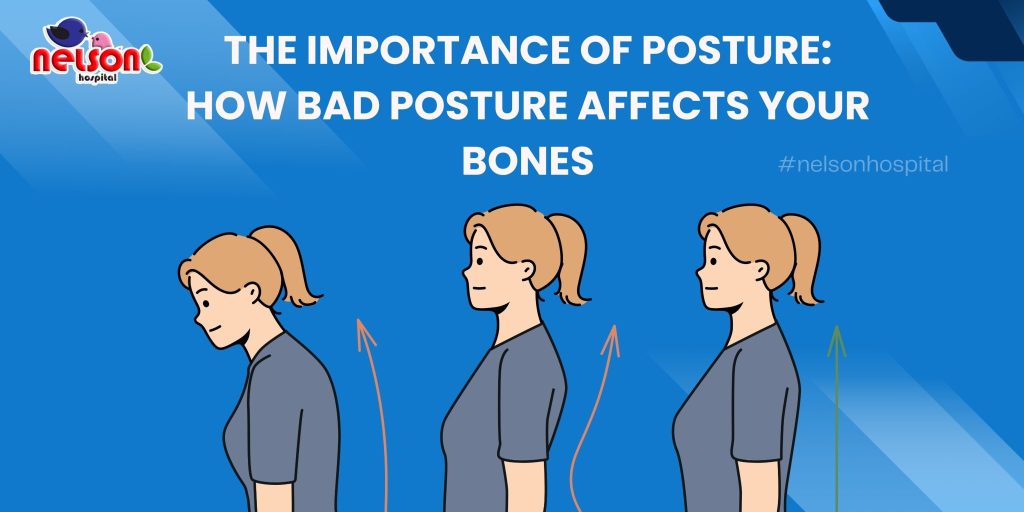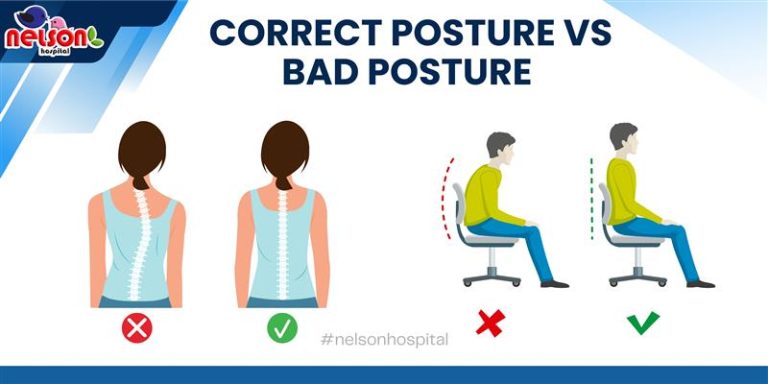
In today’s modern lifestyle, where many people spend long hours sitting at desks or hunched over screens, posture often takes a backseat. However, maintaining good posture is crucial for your overall health, especially your bones. At Nelson Hospital, we emphasize not only treatment but also prevention and education. This blog explores how bad posture can negatively impact your bones and offers tips to maintain healthy alignment.
What Is Posture and Why It Matters
Posture refers to the position in which you hold your body while sitting, standing, or lying down. Good posture keeps bones and joints in the correct alignment so that muscles are used properly. Poor posture, on the other hand, can place stress on the bones, leading to wear and tear, pain, and long-term skeletal issues.
The Science Behind Bad Posture
Bad posture may seem harmless initially, but over time, it contributes to structural imbalances and musculoskeletal disorders. Misalignment caused by slouching, leaning forward, or sitting for extended periods affects the spine and other bones. Your body adapts to incorrect positions, reinforcing bad habits that strain your musculoskeletal system.

Effects of Bad Posture on Bones
- Spinal Deformities: One of the most common consequences of bad posture is spinal misalignment. Poor sitting or standing habits can cause the natural curve of the spine to alter, leading to conditions like scoliosis, kyphosis, or lordosis.
- Joint Misalignment: Bad posture affects the alignment of major joints such as the shoulders, hips, and knees. This misalignment increases the risk of injuries and degenerative joint diseases like osteoarthritis.
- Bone Density Loss: Chronic poor posture can restrict blood flow and reduce the efficiency of nutrient delivery to bones, potentially affecting bone density over time.
- Increased Pressure on Vertebrae: Slouching or forward head posture increases pressure on vertebral discs, accelerating wear and tear, which may lead to disc herniation or other spine-related issues.
- Neck and Back Pain: Although not directly bone damage, prolonged discomfort can result in compensation patterns that eventually stress bones and joints.
Posture and Bone Health in Different Age Groups
- Children and Adolescents: Poor posture during the developmental years can lead to permanent skeletal abnormalities. Early education on posture is essential.
- Adults: Office jobs and sedentary lifestyles are major contributors to poor posture in adults. The risks of chronic pain and bone degeneration increase with age and continued bad habits.
- Elderly: Aging bones are more fragile, and poor posture can accelerate bone density loss, increasing the risk of fractures.
How to Improve Posture for Better Bone Health
- Ergonomic Furniture: Use chairs and desks that promote proper spine alignment.
- Strengthening Exercises: Engage in exercises that build core strength to support your spine.
- Stretch Regularly: Stretch your muscles daily to avoid stiffness and maintain flexibility.
- Take Breaks: Avoid sitting or standing in one position for too long. Move around every 30 to 60 minutes.
- Mindful Posture Checks: Make a habit of checking and correcting your posture throughout the day.
Role of Nelson Hospital in Promoting Bone and Posture Health
At Nelson Hospital, our orthopedic department is committed to holistic bone health. We provide comprehensive evaluations, physical therapy, and posture correction programs tailored to individual needs. Our team of specialists ensures patients receive not only treatment but also guidance to prevent posture-related bone issues.
When to Seek Medical Help
If you experience chronic pain, visible changes in posture, or difficulty in movement, it’s time to consult a professional. Early intervention can prevent minor issues from becoming serious orthopedic conditions.
Frequently Asked Questions
Why is posture important for bone health?
Proper posture keeps bones and joints in correct alignment, reducing stress on ligaments and preventing abnormal wear of joint surfaces.
Can poor posture lead to permanent bone damage?
Yes, long-term poor posture can lead to conditions like spinal misalignment, bone deformities, and early onset of osteoarthritis.
How does bad posture affect the spine?
Poor posture places uneven pressure on spinal discs and vertebrae, leading to back pain, herniated discs, and reduced flexibility.
What are the signs of bad posture?
Common signs include rounded shoulders, forward head position, back or neck pain, and uneven hips or shoulders.
Can posture be corrected in adults?
Yes, with proper guidance from physiotherapists and regular exercises, adults can significantly improve their posture.
Are children affected by posture issues?
Yes, poor posture habits in children—often from heavy backpacks or prolonged screen time—can affect skeletal development.
What role do ergonomics play in posture?
Ergonomic furniture and proper workstation setup reduce strain on your body and help maintain a healthy posture.
Can bad posture cause joint pain?
Absolutely. Misalignment from poor posture can increase stress on joints like knees, hips, and shoulders, causing discomfort or pain.
What treatments does Nelson Hospital offer for posture-related issues?
Nelson Hospital provides physiotherapy, posture correction therapy, orthopedic consultations, and rehabilitation services tailored to posture health.
How can I improve my posture daily?
Maintain an upright position, avoid slouching, use ergonomic chairs, take breaks from sitting, and engage in posture-strengthening exercises.
Conclusion
Bad posture is more than just a bad habit—it can have long-term effects on your bone health and overall well-being. Taking proactive steps to maintain good posture is an investment in your body’s future. At Nelson Hospital, we are here to help you identify posture issues and offer expert solutions to protect your bones.
Maintaining good posture is essential for bone health. Poor posture can lead to spinal deformities, joint misalignment, and even bone density loss. Nelson Hospital provides expert orthopedic care, helping you recover from and prevent posture-related issues. Invest in your health today—your bones will thank you tomorrow.
Book an Appointment







